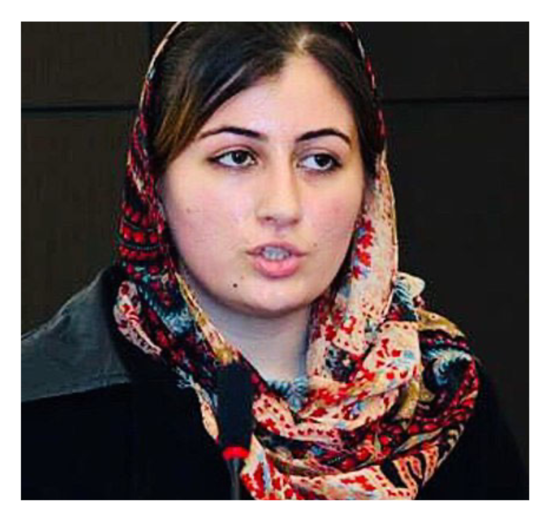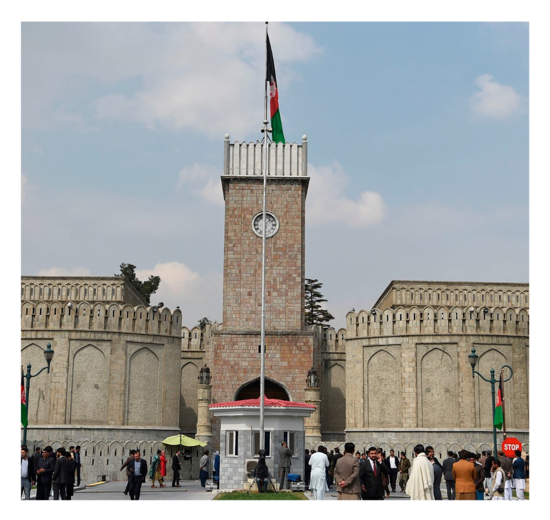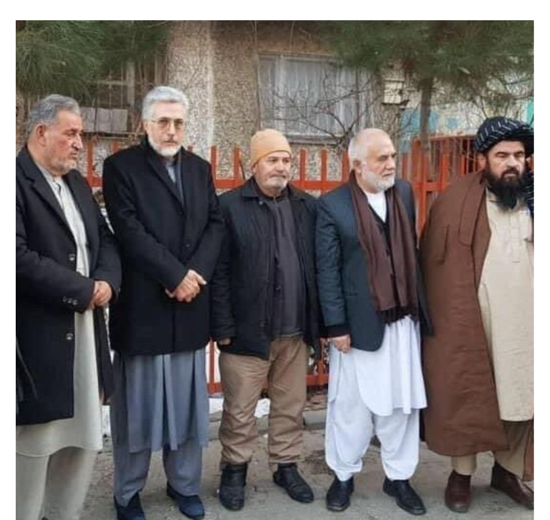Activism is in Hasina Jalal’s blood. She was born and raised in Kabul as part of a family of activists and civil servants. Jalal said that her parents encouraged their children to voice their opinions and to fight for social justice. Her father, a professor of law and political science, has firmly stood for the causes of human rights, democracy, and justice in Afghanistan. Her mother, a professor of medicine, ran for President of Afghanistan twice.

Jalal said that her mother’s first campaign, which took place when she was in primary school, was instrumental to developing her interest in social justice. The family home served as a base for the campaign, and in this atmosphere, Jalal became aware of the inner workings of political and social movements.
“Our house was the hub of the campaign, the hub of political activism because my parents didn’t have the financial means to get offices,” Jalal said. “From that age I became aware of social justice, the importance of raising people’s voices, and being an agent of change. I saw that example in both of my parents.”
Jalal’s experiences outside of her liberal household, however, also played a role in her decision to pursue a life of social justice. She said that her experiences as a girl and young woman growing up in Afghanistan informed her activism and made her passionate about social change, especially regarding the rights of women.
“As a girl growing up in Afghanistan, you are marginalized and discriminated against by default in many ways. As a woman or girl, no matter what your age is, gender is an important factor,” Jalal said. “You are constantly discriminated against or under surveillance. There is constantly some sort of an issue in the workplace, in educational institutions, on the street, at an interpersonal level, and you have to deal with that. You have to deal with so many aspects that girls growing up in the West might not think about.”
Once Jalal reached high school, she began volunteering with Kabul-based civil society organizations that worked with young girls and female heads of household to improve their capacity building. Her experiences with them made her aware of the importance of the economic empowerment of marginalized groups in Afghanistan, including women. For this reason, Jalal chose to pursue economics when she began her undergraduate studies at Kabul University in hopes of one day continuing the sort of work she, at that time, took part in as a volunteer.
“I saw the impact of our work,” Jalal said. “There is a famous saying, ‘If you teach a girl child, you’re not just educating a girl but you are educating the next generation of boys and girls because a mother will educate her son. So investing in that way in women’s livelihood and empowering them and building their capacity, we were seeing a large impact.”
The curriculum at Kabul University, however, lacked the international emphasis that Jalal wanted from her education. On the advice of faculty at the university, Jalal transferred to the Jamia Millia Islamia University in India after two semesters of study. As a competitive student, she received a merit-based scholarship from the Indian government to do so.
After three years in Delhi, Jalal completed her undergraduate degree in economics with a minor in political science. While she considered continuing her education in India, Jalal said she feared she was becoming disconnected from the realities on the ground in Afghanistan and chose to return to Kabul. There, she worked in the government of Afghanistan for three years in different capacities. For one year, she worked in the Presidential Palace, then for six months in the Independent Elections Commission, and then in the Ministry of Mines and Petroleum. Jalal did this while completing her graduate studies in Business Administration through evening classes at American University of Afghanistan.

Although she was working full time in the government and attending graduate school, Jalal remained active in the civil society of Afghanistan. Jalal said she feels that real change is generated at the grassroots level, and, however busy she was at the time with other priorities, her true passion was to continue empowering young girls and women in Afghanistan. As an Afghan woman, Jalal said that she had a clear perspective of her work’s purpose and what she could contribute to Afghan society.
“I see it as a privilege and as an opportunity that I have grown up in Afghanistan among the grassroots,” Jalal said. “I understand what the grassroots, ordinary, simple Afghan girl deals with. And I see that as an opportunity and as a privilege. If I didn’t experience that I would have never been so sensitized and aware of the issues that I am now and I could have never incorporated that in my work. Because knowing things from abstract or theory is different from experiencing them and living them.”
While employed by the Afghan government, Jalal applied for a Fulbright Scholarship to study in the United States. One reason the Fulbright program appealed to her, Jalal said, was that it stipulates that recipients must return to their home country following the completion of their studies and utilize what they learned while abroad. Jalal planned to use the knowledge and skills she earned as a graduate student and Fulbright scholar to eventually continue her work in Afghanistan.
The COVID-19 pandemic, however, delayed Jalal’s plans to return home as her graduation approached. The United States embassy in Kabul was closed, she explained, and she could not renew her visa. Later, the subsequent withdrawal of troops from Afghanistan in spring of 2021 prevented her from returning as foreign embassies evacuated in rapid succession.
Although she was attending university in the United States when the Taliban took Kabul in August 2021, Jalal said that continuous communication with family, friends, and colleagues in Kabul made the experience feel firsthand. She was suddenly bombarded with emails and messages from terrified loved ones.
“People were so panicked. People were so fearful; they didn’t know what to expect, didn’t know if the Taliban would come and behead everyone. They finally announced amnesty [for those who served in the previous government] but people still didn’t believe them,” Jalal said. “So panic is still ongoing. For me the experience was very personal and I was very much involved. It wasn’t like I was externally watching things. It was more like I was there.”
While Jalal’s mother and siblings fled to the Netherlands, her father chose to stay behind in Afghanistan. At the urging of his family, Jalal’s father went to the Kabul Airport to attempt evacuation, but upon seeing the thousands of Afghans there unable to escape, he decided to stay behind.
“He has never left his country during war, not even during the previous Taliban regime,” Jalal said. “He’s very patriotic; he loves his country and his people.”

As an activist in Afghan media for the past two decades, Jalal’s father quickly became a target of the Taliban regime, particularly as he grew bolder in his criticisms of the group. He endured threats by the group and its supporters and was eventually arrested and detained in January. Jalal’s father was released following a week in detention after national and international pressure mounted on the group to honor its claim to amnesty and freedom of speech.
Jalal shares her father’s love for her country, but her contributions to Afghanistan now come from a distance, in the form of scholarship. Once it became clear that returning to Afghanistan was not a possibility, Jalal decided to begin her PhD research. Jalal said that through her research of different programs, she learned about the faculty at University of Pittsburgh’s Graduate School of Public and International Affairs(GSPIA) extensive work regarding Afghanistan.
At that time, however, the program was closed due to the pandemic, so Jalal accepted a fellowship opportunity at Georgetown University. She took graduate courses there while researching, but found that she still wanted to focus more on research related to Afghanistan. After being accepted to the PhD in Public and International Affairs program at the GSPIA, Jalal began her first semester of PhD research at the start of the spring 2022 semester.
While at Pitt, Jalal will be working with the Center for Governance and Markets on the Afghanistan Project and collaborating on research with other Afghan scholars who are at the Center.
“We are hoping to do substantial scholarship and activism on Afghanistan in the Center,” Jalal said. “And, I’m very excited about that, very happy to be here.”
Jalal’s optimism for the future of Afghanistan endures despite myriad hardships currently plaguing her home country. She said that she does not feel that work done in Afghanistan, especially by civil society organizations, over the past two decades was in vain. For example, during the first Taliban regime, Jalal was not allowed to go to school, so she was homeschooled. However, because of the work done in Afghanistan, she said, she was able to go to school, study abroad, and eventually find her way to higher education.
“The past 20 years of hard work that the people of Afghanistan, the new generation of Afghanistan put into their country, into our country, I do not think that it has not had any results. As a society, we came so far. Today when you see women protesting on the streets of Kabul, this didn’t happen all of the sudden. The seed of standing for your rights, for the right thing, for justice, for democracy, for your human rights, was put in those girls when they were very young during these 20 years,” Jalal said. “So, I don’t think that just because the institutions collapsed, society as a whole has lost everything. I think Afghan society has benefited culturally a lot, education-wise a lot. We have a whole generation of young people, especially young girls who are fighters, who are there, ready to take the fight. As a whole, the nation has upgraded. So that work will never go in vain. We are defeated militarily but ideologically, we will never be defeated.”
